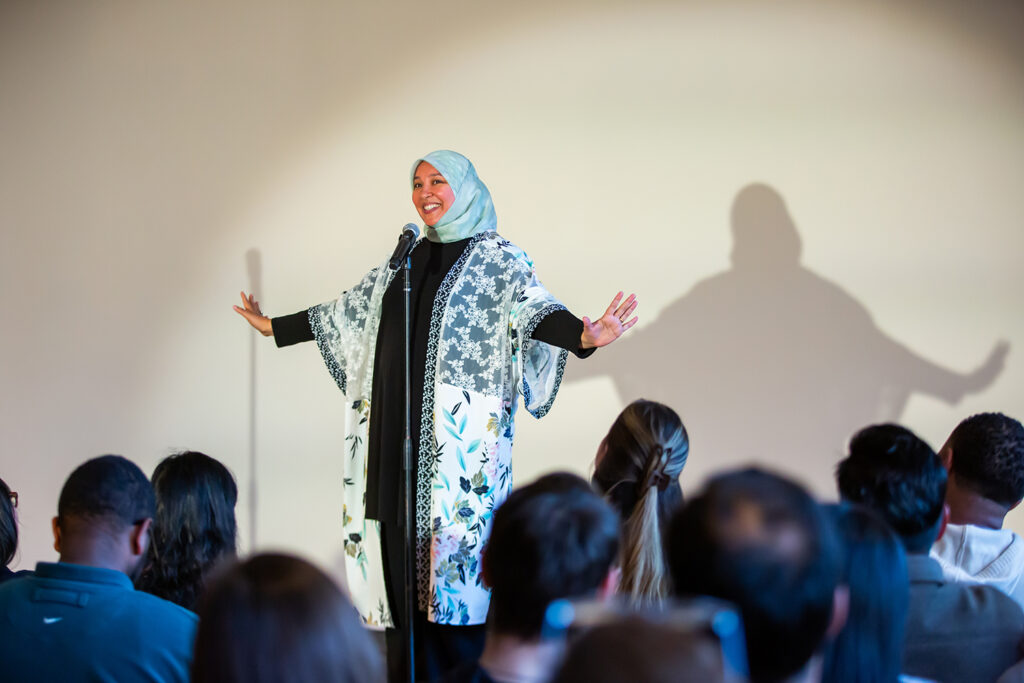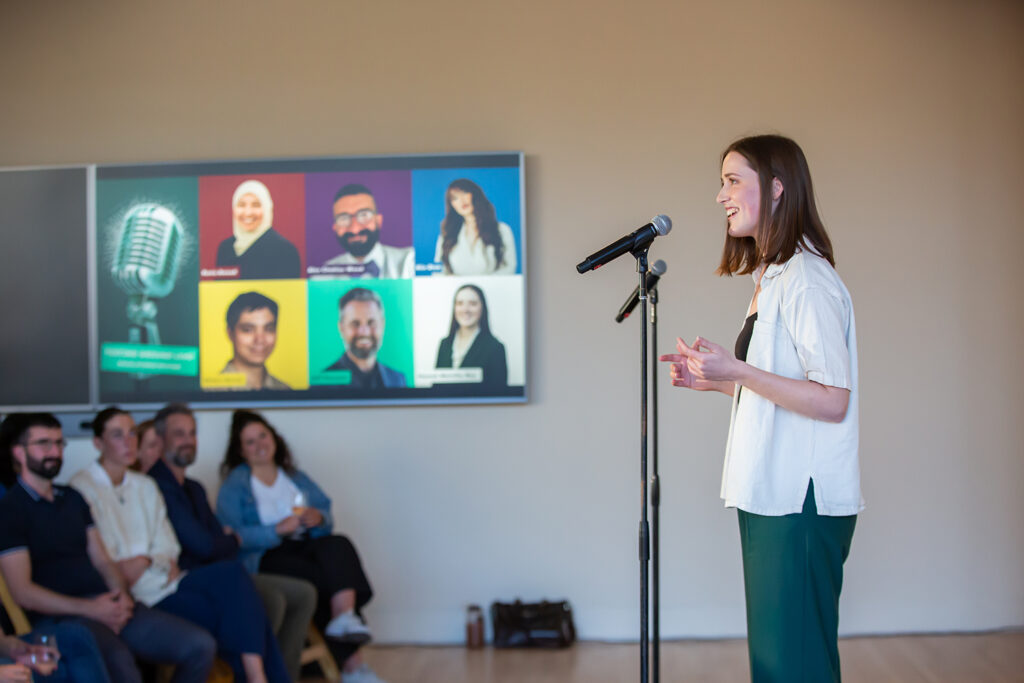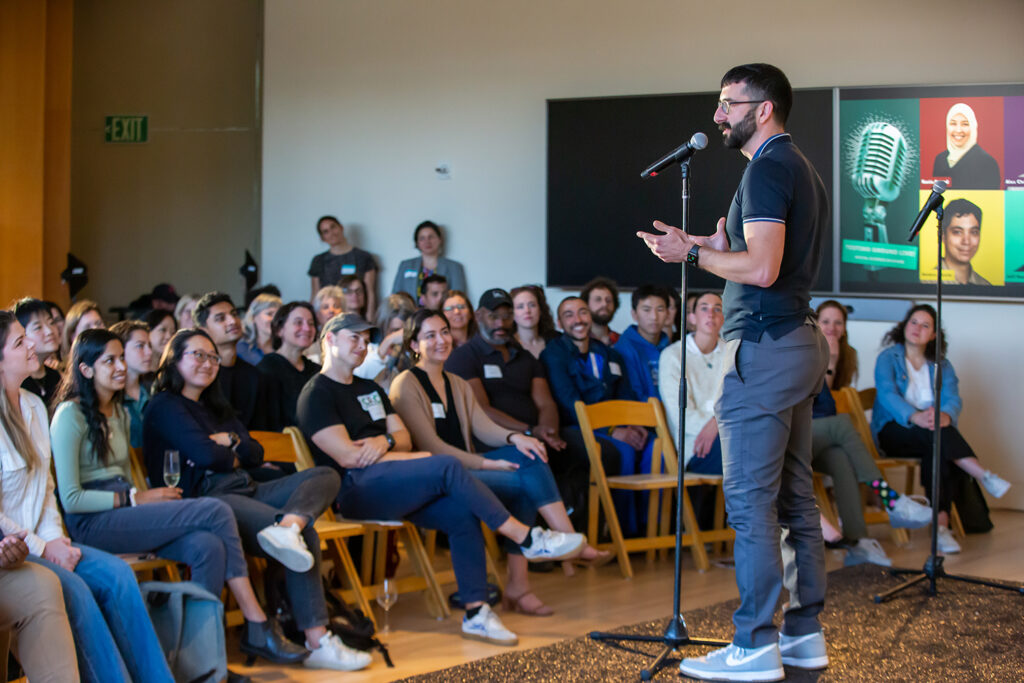Social science takes the stage in a live storytelling event at the Cantor Arts Center
Stanford researchers shared stories of psychotic breaks, economic disparities, and criminal justice reform at an event Tuesday hosted by Stanford Impact Labs in collaboration with The Story Collider.

Dr. Rania Awaad retells the event that encouraged her to pursue a career in psychiatry. (Image credit: Christine Baker)
Late one night years ago, Rania Awaad and her husband were at home when they heard a loud and sudden knock at their front door. When they opened it, Awaad saw a young woman she’d met before at their local Muslim community center.
“Before I could say anything, she runs right past me into the apartment,” Awaad, now a clinical professor of psychiatry and behavioral sciences at Stanford’s School of Medicine, recalled on Tuesday evening at a show titled Testing Ground Live! Social Science on Stage, held at the Cantor Arts Center.
Awaad shared how she and her husband found the woman ducked behind their couch, her eyes wide and terrified. “I need to speak to the imam, my religious leader!” the woman said. Awaad told her that the imam was not in their apartment.
Moments later the woman ran out of the apartment to the community center across the street, still searching for the imam. After deliberating on how to help the woman, some members at the center began to pray for her. Meanwhile, Awaad’s husband contacted a community elder.
“This is a psychotic episode,” the elder said. “She needs to go to the emergency room.”
The woman eventually got the help she needed, but the event left a lasting impact on Awaad, who was struck that no one at the center recognized the woman’s psychiatric emergency and her need for medical attention.
It made Awaad, who was a fourth-year medical student studying to become an obstetrician, realize the importance of mental health, and led her to switch her studies to psychiatry.
Tuesday’s event was hosted by Stanford Impact Labs (SIL) in collaboration with The Story Collider. It featured Stanford researchers like Awaad, a former SIL design fellow, sharing stories of pivotal moments in their lives that changed how they approached their work in mental health, digital literacy, and criminal justice reform, among other societal issues.
SIL is a cross-university initiative that launched in the 2019-20 academic year as part of the university’s Long-range Vision to train and support researchers to serve the public good by using data-driven, social science research to develop actionable ways to address pernicious and pervasive social problems.

Hannah Melville-Rea, a PhD student from Australia, shares what she’s learned about America’s home insurance system and the impact it has on various communities. (Image credit: Christine Baker)
Wild wild west
Another presenter was Hannah Melville-Rea, a PhD student from Australia. At Stanford, she’s studying environment and resources at the Stanford Doerr School of Sustainability, is a Knight-Hennessy Scholar, and was a 2023 SIL Summer PhD Fellow. Taking the stage, she shared that to better understand America’s home insurance system and how (or whether) it serves communities impacted by significant flood risk, she attended two local events. The first was a workshop in Menlo Park for residents to learn how to get the most out of their insurance. She recalled expensive cars parked outside the event. Inside were tables with Tiffany-blue tablecloths and appetizers.
“I look around the room at the other attendees. Everyone is white. Everyone is over the age of 65. I think everyone knows each other because they only asked me to introduce myself,” Melville-Rea recalled.
“I realize this [event] is only applicable if you’re a homeowner with insurance,” she said.
A couple of weeks later, Melville-Rea attended a crowded community meeting in East Palo Alto where residents shared their frustration with flooding and a lack of support from FEMA, the Federal Emergency Management Agency, tasked with responding to natural disasters.
“I cannot get over how different these two community meetings were [and] only three miles apart,” she said. “Up the hill, a bunch of homeowners with good insurance, who honestly, probably could weather a storm without it. Down the road, a bunch of renters who we now know had no insurance, who are really at the frontlines of these climate impacts, and now they’re being ghosted by FEMA.”
She said that as an Australian, she assumed the government would always step in to provide quality security for residents, regardless of their economic status. But she was surprised to learn the opposite was true in the United States.
“We live in the wild west. It is up to the individual. Everyone needs their own safety net,” she said. “And we urgently need to get everyone insurance.”

Alex Chohlas-Wood speaks at Testing Ground Live! Social Science on Stage at the Cantor Arts Center. (Image credit: Christine Baker)
High stakes decisions
Alex Chohlas-Wood is the executive director of the Computational Policy Lab (CPL), which has twice been funded by SIL and where he uses technology and data science to support criminal justice reform. He spoke about a pilot project he worked on for the San Francisco District Attorney’s office focused on “race-blind charging.” The idea, he explained, was to develop an artificial intelligence tool that could automatically redact race-related information from police reports that prosecutors review when deciding whether to charge or dismiss a crime.
His team got to work developing an algorithm for redacting potential indicators of race in police reports, including names and addresses. By the summer of 2019, they had a reliable system, but the project was cut short due to the COVID-19 pandemic. Officials in Yolo County, California expressed interest in the system, so Chohlas-Wood’s team developed one for their district attorney.
“He was so excited about this idea, that he got his own legislator to write a bill mandating that all prosecutors across the state of California use race blind charging by the beginning of 2025,” Chohlas-Wood said.
In 2022, the bill passed unanimously in both state houses and Governor Newsom signed it into law. Chohlas-Wood said he was excited to see his work lead to such meaningful policy changes.
“At the same time, I felt a real sense of responsibility to make sure this thing was done right, and to make sure that we could actually evaluate its impacts and charging decisions – really high stakes decisions – that prosecutors make, that can have profound impacts on people’s lives,” he said.
The next steps CPL is taking to evaluate and scale race-blind charging across California have been funded by a Stanford Impact Labs Stage 2 investment.
In total, six storytellers shared five stories on stage at Tuesday’s event. Recordings of each will soon be available on SIL’s website.